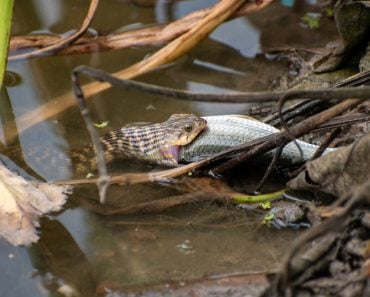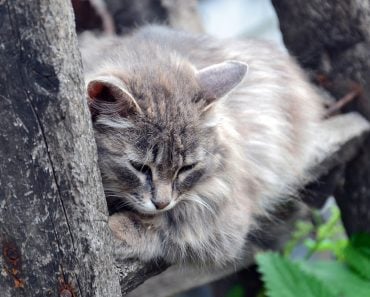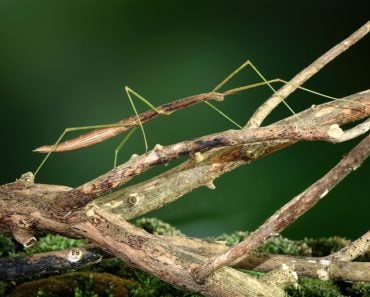Table of Contents (click to expand)
Animals routinely play dead when they’re faced with hungry predators, but animals also play dead to run away from unwanted mates, avoid sex, or avoid being cannibalized.
What would you do if you encountered a grizzly bear during your hike in a forest? You might yell and run as fast as possible, hoping it won’t catch up with you. However, if you’re smart, you might lie down on the ground, play dead and hope like hell that the bear will buy your act.
While it might not work on all animals, the act of playing dead is not unique to humans. There are plenty of animals who have mastered this tricky performance. Humans also are not the only creatures to understand the concept of mortality. Not only are animals aware of mortality, but they take it a step further and use death to their benefit. As paradoxical as it may sound, animals use death to stay alive.
What makes some animals fake their death? There’s more to this than the fairly obvious answer—to avoid turning into another animal’s meal.
Recommended Video for you:
Tonic Immobility
Tonic immobility acts as an anti-detection mechanism. By playing a simple game of freeze and blending into the stillness of the environment, prey can avoid catching the eye of a predator. If there’s no movement, the predator won’t even know it’s there.
Its other function expands beyond going incognito to predators; it also acts as an anti-consumption mechanism. In some cases, tonic immobility happens after the prey has been caught and physically restrained by the predator. Think of this as a desperate do-or-die attempt.

For instance, some ducks play dead when caught by foxes. This can fool inexperienced foxes into thinking that the duck is dead, meaning that there is no need to further immobilize or harm the prey. The duck can use this opportunity to flee when the fox is complacent.
Thanatosis
Thanatosis is the act of playing dead or feigning death to avoid getting eaten by a predator.
The Virginia Opossum tactfully executes an elaborate ruse when faced with the possibility of death. It falls on its side with wide-open eyes and mouth, along with a bluish tongue hanging out. Their heart rate slows down, along with decreased body temperature and slower breathing.
To make the act even more convincing, the opposum urinates and defecates itself and produces a terrible-smelling liquid from its anal gland. In males, the erection of the penis is also observed. As disgusting as it all may sound, it works to save their life!

The opossum is aware of its surroundings and can sense the presence of danger. Once the predating animal moves on, convinced that the opossum is dead and not a suitable meal, the opossum rises back to life and goes right on living.
Now you know what playing possum means!
Certain frogs and the hognose snake perform similar anti-predation deception when faced with imminent death.
As we can see, thanatosis is much more complex than simply laying down with your eyes closed and breath held in, as with tonic immobility. While the animal does lay still, as in tonic immobility, thanatosis has other accompanying behaviors that are done to potentially convince the predator that the animal is dead.
Playing Dead To Avoid Creeps
Imagine a guy or girl that you aren’t interested in walking towards you to ask you out. How would you avoid the awkward conversation of rejecting them?
You could just hide behind someone or something and hope to god they don’t notice you and eventually drop the whole idea of asking you out. Pretty simple, right? What about dropping to the floor and pretending that you’re dead?

It might sound hilarious and a bit too extra, but believe me when I say that it’s a tried and tested solution. At least, it is tried and tested by female European common frogs. The female frog shows tonic immobility, i.e., plays dead, to avoid mating with unwanted male frogs.
One insect that has mastered this technique to get rid of unwanted advances is dragonflies. After mating, female dragonflies that are ready to lay eggs are intercepted by male dragonflies that coerce them into mating. To get rid of these undesirable suitors, some female dragonflies may simply drop to the ground as if they’re dead. The male then hovers over her for a few seconds to make sure she really is dead, before eventually flying off to find another mate.
I think the males of the animal kingdom need to be taught the concept of “No means no,” so females won’t have to put together such elaborate acts of avoidance.
For Sex
You might find it absurd to think that playing dead would help males secure sex with a female, but the Pisaura mirabilis, aka the nursery web spider, proves this notion wrong. It is not necrophilia that I’m suggesting, but rather an ingenious attempt on the male spider’s part to avoid sexual cannibalism.

A study found that male spiders that practiced thanatosis were much more likely to find success in copulation and possibly avoid getting killed in the process.
The male usually brings a nuptial gift (usually prey, such as a fly) while courting the female. At times the male pretends to drop dead when the approaching female attacks him. Without losing its grip on the gift, the male lies on the ground, continuing to act dead. As the female starts to eat the gift he brought, the male comes “back to life” and slowly moves under her to begin mating. A sly move indeed!
Conclusion
By all accounts, it seems that playing dead is not just a trick one can teach their pets for fun. Many animals out in the wild have been practicing it for millions of years to save their lives.
For some, it is the art of staying still to remain undetected, while for others it is the art of putting forth a realistic act of death to evade actual death. A few other animals adapted this behavior not to protect themselves from death, but from the unwanted attention of males. Talk about being innovative! No matter what the purpose, the idea of animals consciously and cleverly faking their own death is fascinating.
References (click to expand)
- Ruxton, G. D., Allen, W. L., Sherratt, T. N., & Speed, M. P. (2018, July 26). Thanatosis. Avoiding Attack. Oxford University PressOxford.
- Animals wrestle with the concept of death and mortality.
- Humphreys, R. K., & Ruxton, G. D. (2018, January 15). A review of thanatosis (death feigning) as an anti-predator behaviour. Behavioral Ecology and Sociobiology. Springer Science and Business Media LLC.
- Rogers, S. M., & Simpson, S. J. (2014, November). Thanatosis. Current Biology. Elsevier BV.












